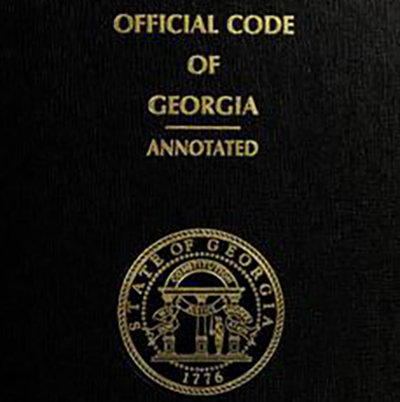Appeals court rules that Georgia annotated code cannot be copyrighted

A bound volume of the Official Code of Georgia Annotated. Georgia Code Revision Commission.
Georgia’s official annotated state code is not copyrightable and belongs in the public domain.
In a unanimous ruling dated Oct. 19, a three-judge panel for the U.S. Court of Appeals for the 11th Circuit reversed a March 2017 decision.
An Atlanta federal judge had ruled that open law advocate Carl Malamud had violated copyright by putting a free copy of the annotated state code on his website. In its ruling, the 11th Circuit panel holds that the annotations carry the weight of state authority. As such, the annotations belong to the people of Georgia and cannot be copyrighted.
“The question is a close one—and important considerations of public policy are at stake on either side—but, at the end of the day, we conclude that the annotations in the OCGA [Official Code of Georgia Annotated] are sufficiently law-like so as to be properly regarded as a sovereign work,” U.S. Circuit Judge Stanley Marcus writes in the opinion. “In short, the annotations are legislative works created by Georgia’s legislators in the exercise of their legislative authority. As a consequence, we conclude that the People are the ultimate authors of the annotations.”
The distinction between law and annotations has long been clear, Marcus writes. Law cannot be copyrighted because it belongs to the people; annotations can be if created by a private party. In Georgia, however, the line has blurred because annotations in the state code are prepared by LexisNexis but considered part of the official code.
Marcus noted that, unlike most states, the annotated code is deemed Georgia’s official code and the unannotated version (which is available for free) is not considered authoritative.
“[T]he annotations in the OCGA, while not having the force of law, are part and parcel of the law,” Marcus writes. “They are so enmeshed with Georgia’s law as to be inextricable. The annotations are themselves law-like insofar as we examine who made them, how they were made, and the role they play in the legislative and jurisprudential spheres of Georgia’s public life.”
The victory was the second major appellate win for Malamud in 2018.
In July, the U.S. Court of Appeals for the D.C. Circuit vacated an injunction forcing Malamud to remove technical standards from private industry groups, like the American Society for Testing and Materials, that are later incorporated into law.
The Georgia case dates to 2013. Malamud, a longtime advocate for open access to law, purchased the entire Georgia annotated code, scanned each page, and put the contents on his website Public.Resource.Org. The state sued for copyright infringement in 2015, requesting an injunction.
“The State of Georgia has no valid copyright in any portion of the OCGA because the OCGA is in the public domain,” Malamud argued in court papers. Malamud was represented by Alston & Bird, the ACLU of Georgia and Washington, D.C. lawyer David Halperin.
In March 2017, U.S. District Judge Richard Story of the Northern District of Georgia granted the state summary judgment, forcing Malamud to remove the state code from his website. “I fought the law and the law won,” Malamud tweeted at the time, quoting lyrics from a recording by The Clash.
On Oct. 20, he sang a different tune, tweeting, “to the people of Georgia: This law is your law. This law is my law. From the Blue Ridge Mountains to the Savannah River. From Morehouse College to the Vidalia fields. This law was made for you and me.” He also put the annotated state code back online.
On behalf of Public Resource, I would like to send the following message to the people of Georgia:
— Carl Malamud (@carlmalamud) October 19, 2018
This law is your law. This law is my law.
From the Blue Ridge Mountains to the Savannah River
From Morehouse College to the Vidalia fields
This law was made for you and me.
The state of Georgia was represented by a team of attorneys at Meunier Carlin & Curfman. When asked whether the state would seek reargument or appeal to the U.S. Supreme Court, Tony Askew, a principal at the firm, declined to comment to the ABA Journal.



